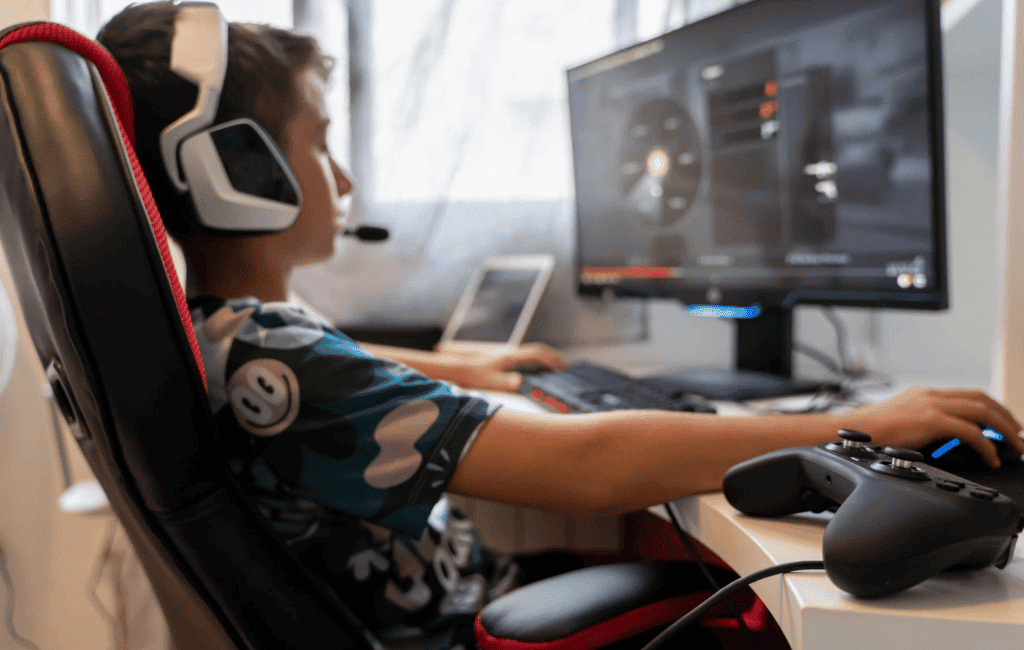
Effective therapy for gaming addiction: Regain control and wellness
With the widespread accessibility of video games and the immersive nature of online gaming, many individuals are trapped in compulsive gaming behaviors that affect their mental, emotional, and physical health. The implementation of effective therapeutic interventions is crucial to address this issue.
Effective therapy offers a well-structured and supportive framework to deal with psychological dependencies and compulsions that accompany excessive gaming. Individuals can develop coping mechanisms, cultivate self-awareness, and regain control over their lives by engaging in therapy.
Moreover, therapy provides a platform for individuals to identify the underlying emotional triggers that drive their gaming habits, helping them constructively confront and address those issues. This article will explore effective therapy methods for regaining control and promoting wellness among individuals struggling with gaming addiction.
What are the signs of video game addiction?

Video game addiction, also known as internet gaming disorder, is characterized by severely reduced control over gaming habits, resulting in negative impacts on daily functioning, including personal, social, educational, and occupational responsibilities.
Here are some signs and symptoms of video game addiction:
Impact on daily life and responsibilities
Video game addiction often leads to poor performance in various areas, including school, work, and household duties, primarily because of the excessive time spent gaming.
As a result, important tasks may be neglected or rushed through in order to allocate more time to playing video games. This neglect of responsibilities can have far-reaching consequences, affecting one’s overall well-being and relationships.
Changes in behavior and emotions
Those suffering from this addiction may experience withdrawal symptoms when they are unable to play games. These symptoms can manifest as heightened feelings of sadness, anxiety, or irritability.
Research has shown that violent video game usage is associated with a lack of empathy and aggression. Likewise, game addicts engage in deceptive behavior, such as lying about the amount of time spent gaming, and they often find themselves constantly thinking about video games.
Inability to control gaming habits
Individuals with gaming disorder often find that they need to invest increasing amounts of time playing games to attain the same level of enjoyment. Despite recognizing the negative consequences of their gaming behavior, they struggle to reduce their gaming time and may repeatedly fail in their attempts to do so.
This persistent gaming, even in the face of problems it causes in their life, can lead them to give up other activities and social relationships they once enjoyed.
Quick tip:
It’s important to note that while many people enjoy video games as a form of entertainment, only a small percentage develop a true addiction. If you or someone you know is exhibiting these signs of video game addiction, it is advisable to seek professional help to address and manage the issue effectively.
Effective therapy methods in gaming addiction treatment
Therapy is crucial in addressing gaming addiction and helping individuals regain control over their addictive behavior. Different types of therapy are commonly used in video game addiction treatment; some of them are:
- Cognitive Behavioral Therapy (CBT): CBT focuses on identifying and changing maladaptive gaming-related thoughts and behaviors. It helps individuals understand the triggers that lead to excessive gaming and teaches them coping strategies to manage cravings, regulate emotions, and develop healthier habits.
- Motivational Interviewing: This approach aims to increase an individual’s motivation to change their behavior by tapping into their intrinsic values and goals. Therapists using this treatment program help clients recognize the negative impact of gaming addiction on their lives and encourage them to explore reasons for change.
- Family Therapy: This therapy type has efficiently treated addiction issues in children and adolescents. Often, gaming addiction affects relationships within families. Family therapy involves working with individuals struggling with addiction and their family members to improve communication, establish boundaries, and provide recovery support.
- Group Therapy: Group therapy sessions bring together individuals facing similar challenges. Sharing experiences and strategies in a supportive environment can provide a sense of belonging and encourage mutual accountability.
- Mindfulness-Based Approaches: The hallmark of the Mindfulness-Based Approach is the self-regulation of attention and the adoption of a particular orientation toward one’s experiences. Mindfulness techniques help individuals become more aware of their thoughts, emotions, and behaviors in the present moment. This heightened awareness can aid in recognizing triggers for gaming and learning to manage them effectively.
How to overcome gaming addiction?

Here are some practical steps that you can take to regain control over your gaming habits:
- Self-Assessment: Reflect on how gaming impacts your life, relationships, and responsibilities. Acknowledge the need for change and commit to making positive adjustments.
- Set Goals: Define clear and achievable goals for reducing gaming time and restoring balance.
- Involve Support System: Inform family and friends about your intention to address gaming addiction. Their encouragement, understanding, and accountability can significantly impact your journey.
- Establish Boundaries: Set specific limits on gaming time. Use alarms or timers to remind yourself when to stop and engage in other activities.
- Time Management: Create a daily schedule that allocates time for work/study, socializing, physical activity, and leisure activities. This structured approach helps prevent excessive gaming.
- Alternative Activities: Engage in hobbies or activities outside video gaming. This helps fill the void of excessive gaming and provides a healthier outlet for stress and relaxation.
- Physical Activity: Add regular exercise to your routine. Physical activity boosts mood, reduces stress, and improves overall well-being.
- Mindfulness Practices: Practice mindfulness techniques, such as meditation or deep breathing, to manage cravings and stay present in the moment.
- Limit Access: Remove or limit access to gaming devices during certain times of the day. This reduces the temptation to start playing impulsively.
- Seek Help: Consider consulting a therapist or counselor specializing in addiction. They provide personalized strategies and support for your recovery.
Gaming addiction treatment programs and centers
There are several treatment programs available for individuals struggling with gaming addiction. Here’s the information about treatment centers for gaming addiction worldwide:
United States
- reSTART® in Bellevue, WA, offers specialized video game addiction treatment.
- Newport Academy in Southern California provides treatment for substance use disorders and mental health, including gaming disorders.
- Center for Families in West Chester, PA, offers a variety of addiction treatment services.
Europe
- Primrose Lodge in Guildford, UK, provides treatment for gaming addiction.
- UKAT in the UK offers comprehensive treatment and aftercare programs for gaming addiction.
Asia
- Solace Asia in Malaysia offers substance and behavioral addiction treatment plans based on scientific and evidence-based research.
- Game Quitters in China and South Korea is an organization dedicated to helping game addicts worldwide.
Africa
- Crossroads Recovery Centre in South Africa provides treatment for a variety of addictions, including gaming addiction.
Australia
- Northshore Kidspace offers treatment for internet, gaming, and screen addiction.
Remember, it’s important to seek professional help if you or someone you know is struggling with gaming addiction. These resources can provide the necessary support and treatment to overcome this challenge.
How to find gaming addiction treatment programs and centers near you?

To find gaming addiction treatment programs and centers near you, you can follow these steps:
- Consult a Healthcare Provider: Your primary care physician, a psychologist, or a psychiatrist can provide referrals to specialists in treating gaming addiction.
- Use Online Resources: Websites like FindTreatment.gov allow you to search for state-licensed treatment centers for addiction and substance use disorders.
- Contact Specialized Centers: Some centers, like reSTART®, specialize in treating video game addiction and offer various programs.
- Reach Out to Support Groups: Organizations like Online Gamers Anonymous often have resources to help find local treatment options.
- Insurance Provider: Check with your insurance provider, as they often have a list of in-network treatment centers.
Importance of therapy in managing gaming addiction
Therapy differs from self-help approaches primarily due to the guidance of a trained mental health professional. Here are some importance of seeking treatment in managing gaming addiction:
- Therapists are trained to assess the severity of addiction or substance abuse, identify underlying issues, and create tailored treatment plans that address individual needs.
- Regular sessions with a therapist provide accountability and motivation for change, helping individuals stay committed to their recovery journey.
- Therapists can address underlying emotional and psychological factors contributing to addiction, promoting overall well-being.
- Therapists can adapt treatment strategies based on an individual’s progress and changing circumstances.
- Therapy provides a confidential and non-judgmental environment for individuals to discuss their challenges and work toward recovery.
Frequently Asked Questions
Effective therapy treats more than just gaming addiction
It is important to note that seeking professional help for co-occurring mental health issues is crucial. Video game addiction is often accompanied by underlying psychological challenges such as anxiety, depression, or attention issues. Addressing these issues through therapy or counseling helps you manage triggers and establish healthier coping mechanisms, increasing the likelihood of successful recovery and preventing relapse.
Setting boundaries, managing your time, and engaging in alternative activities are crucial to breaking the cycle of excessive gaming. Boundaries establish a clear framework for when and how much you can play, while effective time management helps you allocate time to various vital aspects of your life. Engaging in alternative activities reduces the time available for gaming, introduces variety, and enriches your life outside gaming.


Leave a Comment